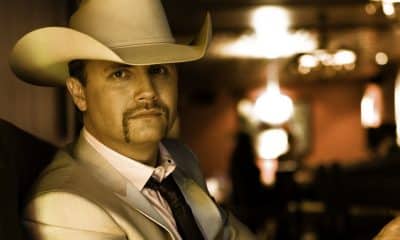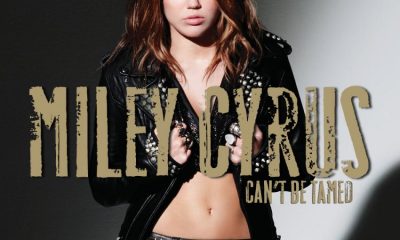Interviews
Steve Wariner Talks Grammys, Chet Atkins, and Guitar Battles

Steve Wariner, known primarily to contemporary country audiences as the voice behind chart-toppers “Holes In The Floor of Heaven” and “I’m Already Taken,” has recorded 18 studio albums, scored 10 #1 singles and won three Grammy awards over his 30-plus year career.
In addition to all of that commercial success, 2009 marked the completion and release of one of Wariner’s most personally satisfying (and critically acclaimed) endeavors, a principally instrumental tribute album dedicated to the music of his mentor, the later producer, music executive and guitar virtuoso Chet Atkins.
Wariner recently spoke with The 9513 about that project and his relationship with the late country music icon.
JIM MALEC: Congratulations to you on your recently announced Grammy nomination.
STEVE WARINER: Thanks. I’m tickled about that. There are so many great artists involved in the Grammys. You know you’re always going to be up against somebody great. I’m just honored to be in there. I’m just honored to be recognized and nominated.
JM: This is, I believe, your third nomination in the Country Instrumental category. Is there a bit of sentimentalism attached to this particular nomination, given the nature of it?
SW: I’ve been lucky to win three Grammys over the years, and I’ve been nominated several times. This one is definitely special. Having a project that’s honoring my mentor and my friend Chet Atkins, yeah, this one is special.
The particular track is called “Producer’s Medley,” and it honor’s Chet’s body of work as a record producer. It shows off the fact that he produced hit records on people like Al Hirt, Perry Como, Don Gibson, Jim Reeves, The Everly Brothers. It shows off the wide range, and the great body of work, that he had as a producer–aside from his guitar playing. I love it that this nomination is honoring him, and I’ll say that if I’m lucky enough to get up and speak.
JM: I want to go back to the point about Mr. Atkins as a producer later in this interview, but first let’s talk a bit about the project from which “Producer’s Medley” comes. Your tribute to Mr. Atkins, which is primarily an instrumental album, was released back in June of 2009. Who did you record that album for, and with whom has it found an audience?
SW: We said from the outset that this was something that had to be done regardless of what happened with it or where it went. For me, it was just something I had to do. I really wanted to honor Chet, and I wanted to do it for Chet’s wife, Leona. I’m thrilled that she got to hear it—she passed away a couple months ago, but she got to hear every bit of it. We listened to it together and she was really thrilled with it.
I understand that it’s for a specialized market. We knew that from the outset. We hoped that it would be something a lot of guitar players would appreciate, as well as the Chet followers and fans. Of course, we also wanted to appeal to fans of great music in general, who maybe weren’t huge fans of Chet. We hope that it’s also just music that people will enjoy and like to hear.
The whole thing about this album, Jim, is that it has a wide breadth of styles. I purposely tried to illustrate the different styles that Chet mastered and played in. He played brilliant classical music, swing and, of course, jazz–even different shades of jazz. There’s also the strait country stuff. He was all over the map with his versatility.
In a selfish way, though, the album is for me. I really wanted to honor Chet regardless of where the project landed or what it did, commercially. It was something that had to be done. People from the record label, the ones who pay for things, they don’t want to hear that stuff, necessarily. But, artistically, it was something I really wanted to do…and that I’ve wanted to do since June 30, 2001, when he passed.
JM: How have your fans, who have followed you throughout the years, responded to this album?
SW: Their response has been tremendous. Even more than I had hoped for, to be honest with you. I think my fans understand. I think they get it. This is my tribute to him. This is something that had to be said. And I appreciate their understanding, because a lot of the fans who are with me now are hard core fans who look for me to sing songs and write.
I’ve played a few times since I recorded this album. I’ve done a few shows. It’s really nice to be able to do my regular show with a segment in the middle dedicated to this project. That’s the part of the show when you can hear a pin drop. People are respectful and they’re listening intently. I’ve gotten more great response from this project than probably anything I’ve ever done, to be quite honest. People just really like the fact that I’m showing off another side of what I do. My first love, really, is guitar, and they get to see a glimpse of me they don’t always get to see. They’re looking at a little part of my career that’s not the typical. It’s lets ‘em look through the keyhole a little bit.
I won’t be doing this type of project forever. I’ll definitely be getting back to my songwriting–I already have, actually–and my regular business. But it sure is fun to do this and to get this kind of recognition. It’s been tremendous, with the ink and the reviews. I think people really get this. They really appreciate that I’ve put this much care and love into a project.
JM: As someone who knew him personally and professionally for many years, how would you characterize Mr. Atkins’ most enduring contribution to country music?
SW: It’s kinda like Owen Bradley. Immeasurable is the word. In my opinion, those two men are the architects of what country music is and what it became.
One of the major things that each of those guys did, but certainly Chet, was bring the studios here. He brought RCA and Steve Sholes from New York. He created the template for everything going on today. He was instrumental in bringing the studios and the labels. Of course, one of the first things RCA did was bring in Elvis and cut “Heartbreak Hotel.”
Chet was the consummate record executive. He was an artist, but he was also producing other great artists. I mean, the roster of artists he produced is just incredible. I saw a list one time, three pages just full of people that would blow your mind. From Dolly Parton to Elvis Presley to Waylon. I was glad to see my name on there, and especially as one of the last artists he produced. I think, me and Paul Craft were two of the last. I was thrilled to be on that list.
What Chet contributed, not only as a record executive but as an artist, a player–I mean, there are young players sitting around today still going, “Wow, how did he do that?” They’re still trying to learn those licks. A hundred years from now they’ll still be trying to figure those things out. He was just such an innovator. Such a creative mind.
JM: Like Mr. Atkins, you are considered one of the truly great guitar players. From that perspective, what is your opinion of the state of the musician in country music today?
SW: Back in the days there were great instrumental artists. It was a viable field. Instrumental music got airplay. You heard it on the radio. They sold records. Now, it’s just sort of incidental, behind the background kind of stuff.
JM: Why do you think that is?
SW: Well, I don’t know. The times just change. Back then, you had Duane Eddy and there were all kinds of great instrumental artists. I wish that was still the case. I think the commercial world just no longer has a place for that. I can’t really explain it. There’s movies and television and the world just kind of moved on, I think. But I love those artists. Santo and Johnny. Back then, you could have a Boots Randolph. There were so many great instrumental records. It’s been a long time since there was anything like that. And certainly, Chet was at the forefront of that. Les Paul with Mary Ford, too.
Time marches on. The trends change. Pop culture changes. Of course, that’s the neat thing about the Grammys. They still honor that genre, one that doesn’t have a place anymore on radio.
JM: Are there young musicians in Nashville who you admire and see as torchbearers for the next generation of great guitar players?
SW: I think there are. You know, Brad Paisley certainly is. He’s carried on that tradition. He’s really a player and he’s put instrumentals on his records. I love it that they let him do that. I used to have to fight the label. Every now and then they’d let me do an instrumental. I’d do something here and there, but they fought me over it. They know it’s not gonna be on the radio. They know they’re not gonna make money from it. I like it that he’s got enough clout that he does it. And, last year, I won a Grammy for an instrumental that I was lucky and thrilled to be with him on.
There’s also a guy named Jedd Hughes, an Australian guitar player who I really admire. He’s a young kid who is a singer/songwriter, but he’s from that same ilk. He’s a player. And a really good player. If he gets to a place where he can get the wheels turning, he’ll be from that same mould too. He’s a great player, but he writes and sings too, so he’ll have a two-pronged or three-pronged career.
JM: Of course, one of the undying questions in country music circles is, “Who would win in a guitar battle between Brad Paisley and Keith Urban?” Care to take a side on that one?
SW: I would! (Laughing). No, I’m kidding man. That’s a good question. The interesting thing is they both have their own style. It’s like apples and oranges. So, it’s hard to say. But they’re both tremendous players. They’re so different. I’ve had the chance to play a lot with both of them, so I know real well how they play.
When Keith and I were on Capitol, they always loved to pair us together. What I loved about him, and really admired about him, was that he doesn’t even need to rehearse. Keith’s such a great player that we could say “let’s wing it.” So we’d walk into a studio full of radio people, or whoever the label was trying to court, and we’d each do a few songs and then they’d say, “OK, now you guys play some stuff together.” I’d just reach over to Keith and say, “Hey man, what do you want to play?” We’d just go right on the fly with it. We purposely did it on the fly. We’d just start jammin’. I love it that he’s that kind of player. And there are not not many players like that. You can just throw something at him and he’s right there with you. He never misses a beat. He’s that great of a player. Brad’s that way, too. Brad’s really a tremendous player. He knows his instrument very well.
So, I don’t know would win. I guess it’s a preference thing. They’re both phenomenal.
JM: We should try to get all three of you up on stage someday. Let’s make it happen. You guys can just jam it out.
SW: Well, you’d have to thrown in Vince and some other guys. Hey, I’d love it. That’d be fun.
JM: We’ll make it happen.
SW: I’d like to get in on that.
JM: You recorded your first album more than 30 years ago. Way back in 1976. Does that sound right?
SW: Yeah, that was the first stuff I ever cut. Well, ’77 I guess you’d say. That’s a long time ago. (Laughing). Of, course, I was very young, Jim.
JM: Of course. You were a prodigy.
SW: There you go.
JM: Since we’re talking today about a man probably as noted for his contributions behind the control board as for his contributions on the fret board, what are some of the changes that you’ve personally witnessed in the way music was recorded then and the way music is recorded now? And do you think that those changes have been good or bad for music?
SW: You’re hittin’ on a great question. To give a short answer would be hard. I’m gonna do it, but you could talk on this for a while.
The changes have made recording easier. It’s easier to make great records. But I don’t necessarily feel like it makes things better. I should preface all of this by saying that I’m more of a purist. I’m not a big fan of tuning. Of course, the average person out there doesn’t even know about that stuff. Vocals can be tuned to be perfect even when the singer’s not.
To me, with technology and all of that, on one hand it’s great but on the other…well, it’s a double edged sword. People know that something is kinda sterile in music, but they don’t understand why. It’s because of the technology.
I’m lucky that I caught the era of record making where I could watch Chet bring players in and treat those guys with respect. He would get a performance out of everybody. It was more like a live performance, whereas today it’s just layering people. You see a lot of things these days where people email stuff back and forth. The people aren’t even in the same room. There’s nothing like having a room full of players and just letting them do a performance. I mean, having the vocal go down with the players is unheard of anymore. And it’s too bad, because that type of recording allows you to capture a little slice of time, to capture a real performance.
Frank Sinatra had it right. The players would rehearse, the orchestra would rehearse, and he’d walk in and sing it once–maybe twice–and that was it. That does not happen anymore. It’s just the way it is now. Time marched on. It’s a different world. Back then we had the 2-inch tape machines rollin’. Reel tape. Analog tape. Tube mics. It was awesome. But I’m a purest. You asked the wrong guy on that one. Or maybe you asked the right guy. I just love the performance element of records. I miss that. And I think you can hear the difference between those records and ones that are layered.
JM: Given that answer, how do you feel about things like Guitar Hero and Rock Band and those video games where kids spend so much time learning how to play a virtual instrumental as opposed to learning to play the instrument? What do these things say about the future of music?
SW: Ask any guitar player if they like Guitar Hero. I played that game one time, for about two minutes. I said, you know what? Someone else can play that game. I hate that game. Ask any guitar player. They hate it. They don’t want anything to do with it. You can ask ‘em. I’ve asked several. You’re right about that. Why doesn’t that kid go learn how to play the guitar? Why doesn’t that kid put hours and hours into really learning to play? Guitar Hero isn’t even close to the same muscles you use in your hands and arms to play.
Another example is this show that used to be on–I think it still is–about who could lip sync the best. That is the stupidest thing. Come out and really sing.
Chet told me, years ago, “Man, there’s no shortcuts to it. You work for it and earn it.” Work hard, put your nose to the grindstone. And so I think the technology is a double-edged sword. It’s gotten us away from valuing real performances. It’s just like with Photoshop–it gets harder and harder to know what’s real and what’s not. Sometimes I get tapes of performers, and it doesn’t do me a lot of good to hear them on tape because it could be tuned and doctored. I have to go hear them live. Unless you hear ‘em live, you don’t know what’s real or not.
Sometimes we use technology as a crutch, and that just teaches the wrong things and sends the wrong messages all the way across the board. You’ve got to work for your success and earn it. There are no shortcuts. Whenever people ask me in interviews about some of the great things I learned from Chet–and pretty much everyone asks me that–that’s probably the number one thing I recall. That right there. You go work for it.
JM: I’m glad you made that point, because that question was next on my list. So I’m glad I don’t have to ask the same thing as everyone else.
SW: Early on, we had two or three singles out. Nowadays, if you have two or three shots at it it would be a miracle. But back then, we had two or three singles out before anything really stuck, you know. And I remember being so impatient. I was a young, 20-something year old. I was in my early 20s with a record out that didn’t do anything, and I’m all hacked-off, going, “Why wasn’t that a hit!” and so on, thinkin’ that way, and, of course, Chet pulled me aside and said, “Just have patience. It doesn’t happen the same way for everyone. Work hard, and when it’s your time it’ll happen. If it’s supposed to happen.”
Just because you’re on a big label and you’re with Chet Atkins, that doesn’t mean you’re gonna have a hit record right away. I thought maybe it did. He taught a lot of those lessons. As for overnight success, he always said that some nights are longer than others.
JM: We spend a lot of time her e at The 9513 exploring the definition of the term country music. So, one question we ask pretty much everyone we speak to is: “What is country music?” I think in terms of this conversation, that question is especially pertinent, because Mr. Atkins really challenged some of the accepted boundaries and traditions of the format. What, in your opinion, does the term “Country Music” mean today? And how did Chet affect that?
SW: Chet and Owen Bradley and those guys, you know, were credited with ushering in what was known as the Nashville sound. And that wasn’t always spoken of as a positive thing. I’m not sure how it’s perceived now, but it used to be that it was perceived as a negative thing. I think a lot of people looked at it as a negative thing. We’ve got strings? We don’t need strings in country music. That kind of an attitude.
I always looked at that as an incredible thing. It took country to places where it had never been before. It opened it up to a wider demographic. It helped it sell records in places it had never sold records. Those great Eddy Arnold records…he sold millions of records in the pop world, but he was really a country artist. Those lines were getting a little blurred even back then.
So, now I think it’s probably looked on more as a positive thing. But a lot of people didn’t like it. A lot of those purists just thought we did not need strings in country music.
But Chet was more than just a great country artist. He had great musical sensibilities. He was a classical player. He was a jazz player. He was a record executive. He could play mountain music or Appalachian kind of stuff, but he could also play with the best jazz players in the world, or Arthur Fiedler of Boston Pops. He did everything.
As for country today, you know, if I didn’t sound bitter a minute ago I probably will now. Country has blurred so much now…
Record labels want that. They want it to be more American Idol-ish. That equates to record sales. It’s a bigger business. They’re selling to a wider demographic. And I guess that’s natural. That’s a natural thing. They’ve got guys there trying to figure out how to sell records, and they’re doing it through young people. It is what it is.
But I think country music means something different to different people. For me, it means one thing. For young people it means something else.
JM: What does it mean to you?
SW: To me, I think back to my dad. I was raised up listening to his bluegrass, and real country music–the kind of thing he was raised up listening to. I listened to the Opry, and a lot of fiddle music and mountain music. But it’s funny–when Bryan White came along and became popular, I was talking to him one day about the Opry, and he made a good point. He said, “You know, I never listened to the Opry much.” He was more from a generation that grew up with Nashville Now on television. For me, I listened to the Opry on the radio because of my dad, so I was raised up inspired by that type of music. I love all kinds of music and I listen to everything, but I love that kind of music especially. It takes me back home.
But it just depends on who you ask. Younger people, all they know is the country of today. Unless they research and become musicologists, in a way. So, it’s a complex question. But the main point is that the carrot’s in front of the horse, held by the record labels. They’re takin’ it where they want to take it. We’re all chasin’.
In turn, and speaking totally as a writer, I have to write songs that are going to appeal to artists who are going to be on radio. I have to write those songs if I want to get my stuff on radio. It has to be relevant and fresh to young people. It’s a complex thing. We’re in a world that’s about big business. And I think artists, especially those of us who have been around for a while, are forced to find their own niche. You have to figure out how you can make it work for you. You have to figure out how you can get your music out there on your own. It’s up to you, pretty much.
- Lists13 years ago
Top 10 Country Music Albums of 2010

 Interviews5 years ago
Interviews5 years agoJohn Rich – The Interview

 Song Reviews16 years ago
Song Reviews16 years agoTaylor Swift – “Love Story”

 Interviews5 years ago
Interviews5 years agoHoneyhoney on Hiatus: Revisit our 2008 Interview with Suzanne Santo

 Album Reviews14 years ago
Album Reviews14 years agoAlbum Review: Miley Cyrus – Can’t Be Tamed

 Song Reviews6 years ago
Song Reviews6 years agoThe Band Perry – “Hip To My Heart”

 Columns5 years ago
Columns5 years agoThe Link Between Folk Music’s Past and Present

 Columns5 years ago
Columns5 years agoIs Marketing Killing Rock and Roll?













